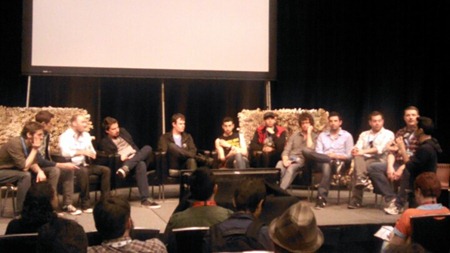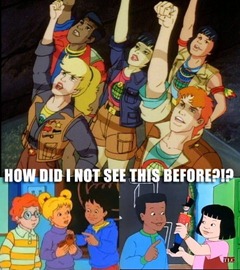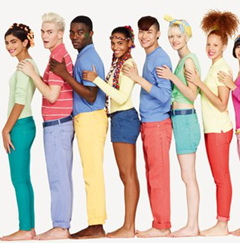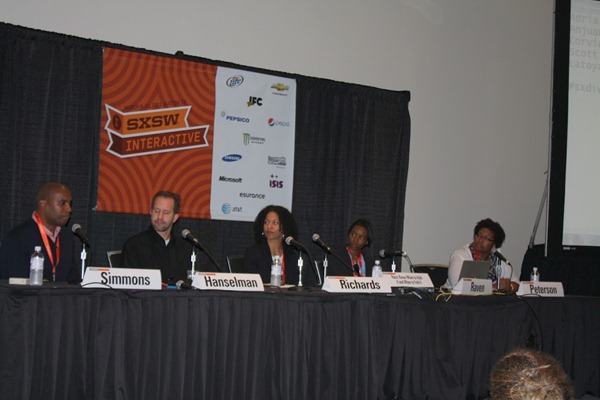On Pie Chart Diversity at Technical Conferences

This last week at the SXSW (South by Southwest) conference I appeared on a panel that discussed "What can technology conferences do about diversity?" (the audio is up at that link also)
The picture at right is NOT that panel.
I speak at or attend between 12 and 20 conferences a year. Too often panels and speakers at conferences consist only of white males between the ages of 25 and 35. This year at SXSW we hosted a frank conversation attempting to answer some questions like "what is diversity (hint, it's not just color)", "how can we make technology conferences more inclusive," and "why should we value diversity at all?"
Our panel consisted of
- Adria Richards - Technology Consultant
- Anjuan Simmons - Principal, Adverlyze
- Corvida Raven - SheGeeks.NET, Catalyst at TED
- Scott Hanselman - Microsoft (me)
It was expertly moderated by Latoya Peterson, Racialicious.com. Our panel was also mentioned in an article at Salon.com, although perhaps not for the reasons we would have liked.
A number of interesting and compelling points were made during this panel.
 Anjuan brought up the issue of the "pipeline" of potential technology workers and conferences attendees. We need to continue to make sure that everyone has the opportunity to access technology and express interest in technology. This starts with making sure schools put adequate focus on STEM (Science, Technology, Engineering, and Math) programs.
Anjuan brought up the issue of the "pipeline" of potential technology workers and conferences attendees. We need to continue to make sure that everyone has the opportunity to access technology and express interest in technology. This starts with making sure schools put adequate focus on STEM (Science, Technology, Engineering, and Math) programs.
Anjuan also spoke about the pressure for minorities to be stewards for their respective groups. As a white male if I'm late for a meeting that reflects poorly on me, but if Anjuan is the only black male in a meeting and is late he feels that may reflect poorly not only on him, but any prospective future hires. While it's not the same, I relate somewhat as a Type 1 diabetic on a pump. I am aware that if I am unable to travel, am sick often, or am in some way unable to do my job effectively that may reflect poorly (and has in the past in my experience) on other diabetics. This could then make the company reticent to hire folks that follow in my footsteps.
When I travel overseas and meet new people I am an American representative, and it's on me to be a good one. When I travel in the rural areas of Zimbabwe I want to leave a good impression of white Americans. We are all stewards of our respective groups, and PoC (People of Color) certainly feel that pressure more than others.

I offered my perspective as the only white panelist. I feel that many people say "I don't see color," but that's like saying "I don't see you. I don't see your experience." We are the sum of our experiences, our abilities and disabilities, our languages, our color, our place of birth and a thousand other characteristics. While color is an easy categorization, so is height, weight, gender, number of extremities and a bunch of other physical characteristics.
We need to resist the temptation to move from all white panels and apply "pie-chart diversity" to our groups. Pie Chart Diversity is my term for when you have one Black man, an Asian girl, a blonde white person and a brunette, and perhaps a Latino in a arbitrary group. You see this pattern in sitcoms and cartoons time and time again. It might make for a nice Benetton ad but it doesn't make for a good tech conference.
Don't assemble colorful panels, assemble diverse panels.
Value lies in diverse perspectives, not aesthetically pleasing color swatches. An all white panel can be a diverse panel if it includes a variety of ages, genders, languages, education levels, countries of origin and more. Don't ask yourself questions like "Why is this panel only white men" but rather ask yourself "where are qualified women and people of color for this panel?"
My point to the audience was that awareness is the key. If you are assembling a panel or conference it's OK if you are a white person to ask yourself "do we have a diverse and representative group of perspectives in this talk?" If you are participating in a talk, it's OK to ask the organizers or suggest friends who might bring an interesting perspective.
Corvida brought up the importance of tapping your own network. If she is the only PoC at a conference, perhaps she needs to reach out to her own network and let them know that the conference even exists! Lots of people have never heard of CodeMash, SXSW, or OSCON. Spread the word and encourage folks to submit. There's also BarCamps and CodeCamps as a way of starting small.
Thanks to Adria for organizing the Panel, to Latoya for excellent moderation, and to Anjuan and Corvida for their unique perspectives! To those that attended, I hope you enjoyed it as much as we did. There should be video and audio of the event soon. I'll update this post when it's available.
Recommended Links
- Hanselminutes Podcast 303 Improving Diversity in Technology with Kimberly Bryant from BlackGirlsCode.com
- Hanselminutes Podcast 203 Women in Technology in the Muslim World
- Hanselminutes Podcast 156 Dealing with Diversity in Agile Teams with Aslam Khan
About Scott
Scott Hanselman is a former professor, former Chief Architect in finance, now speaker, consultant, father, diabetic, and Microsoft employee. He is a failed stand-up comic, a cornrower, and a book author.
About Newsletter
I think what you're saying is . . .
Girls suck at math http://xkcd.com/385/
Totally agree with you: Diversity is about variation in thought. And I find truly original thought to be very hard to find these days. I would love to hear a solution to an architectural problem in C# that maybe looks like one of these:
- You know, in Ruby, we typically don't encounter this because ...
- DNS sys admins deal with complex network effects differently, here's how ...
- This type of organizational issue was tackled in the Koran and they went about it like this ...
"An all white panel can be a diverse panel if it includes a variety of ages, genders, languages, education levels, countries of origin and more".
+1 Great post.
But one of the solutions to institutionalized racism that has been particularly effective is affirmative action which sometimes looks like piechart diversity. The idea being that promoting people who may be unqualified to positions of influence will produce a level of success and education that will provide their descendants and mentees opportunities that they might not otherwise have had. We do this for future generations, not for this one. We know that education in the early years is critically important and that having educated, well-off parents are critically important to success even if they're not a requirement. Given sufficient time and opportunities minorities will bridge the gap, but they have to be given that opportunity.
I think you goto conferences to learn something. To pick folks brains. To hear about why you're doing something wrong or how you can make improvements going forward. Typically "color" doesn't impact any of these.
The moment tech conferences start to use affirmative action standards for placement of speakers and guests, I'll throw in the towel. That isn't what learning is about. Not now, not ever. Affirmative action programs to generate pretty little balanced pie charts are already discriminatory on their own, so I'd rather not see those expanded.
Altough I do agree on the message that you're trying to send here, I think sometimes we tend to be to politically correct.
For example you say: Don't ask yourself questions like "Why is this panel only white men" but rather ask yourself "where are qualified women and people of color for this panel?"
In my opinion, the only question to be asked should be "where are qualified people for this panel?"
Your first phrasing has a tendency towards discriminating white men.
I do realize that often we need to provide some extra counterweight in order to establish the balance, but why not do it right immediatly and feature people based on ability and knowledge instead of on what cultural group they belong to?
Kenneth - Understood, and that's not the intent. I think white men can handle it, though. Perhaps a better question is "where is a diverse group of qualified people for this panel?"
But I am in complete agreement with you on the value of representative diversity. My point on affirmative action is that in itself it creates discrimination or exclusivity which seems to go against legitimate representative diversity.
That said, our team is remarkably diverse with people from many countries & ethnic groups. Germany, India, China, Dominican Republic, Albania, and Iran(!) are represented in our group, along with more than the average share of female members (for an IT group). As a Scottish white male, I am actually the minority of the group.
Diversity is out there, but I find that due to cultural differences, many of the "outsiders" tend to be less vocal and outgoing and are more likely to work with their heads down rather than participate in local groups or conferences. American males are encouraged to speak out and seek leadership roles and it's not surprising that these types gravitate towards speaking roles in conferences. More could be done to encourage people of "diversity" to seek out opportunities to be heard. It's a real challenge, though. It's hard enough learning a 2nd language, let alone public speaking in a 2nd language while talking about a technical topic!
The entire concept baffles me (in case you can't tell). I don't care where you're from or what you look like or what you sound like. I care what you have to say (and a little bit about what you've done to help establish your credentials, although even that holds very little weight with me). If what you have to say is helpful or interesting, and if you can back it up with data or a rational, articulate argument, then you have my attention (Scott, you are a great example of that - even as a white male). If not, you don't. Nothing else matters.
Granted there will be much overlap, but to attempt to equivocate the terms simply will muddy the waters.
One point I believe worth considering, which I didn’t notice explored in the article: Diversity as relates to the audience. No matter the differences in the make-up of the hypothetical ‘all-white yet diverse panel’, should the audience be women and should we remove women from the hypothetical panel, it seems quite difficult to suggest that panel is representative of the audience’s experience.
It says something that people are asking either variant of Mr. Hanselman's question ("Why is this panel all white males" or "Where are all the qualified people of color/women/disabled etc") whereas a decade ago, no one might even have noticed (I was not around the tech industry then, but I assume it to be the case).
While it is disturbing that it takes this sort of effort, over periods measured in years and decades, to bring a representative sampling of qualified voices to the table, it is the very discomfort we feel when we notice the lack of diversity that demonstrates progress. We're NOTICING. And when I say "we", I mean (to paraphrase the author) "the union of all the sets of people."
Discussing issues of diversity can be uncomfortable, especially for white males, because we have become conditioned to the idea that, publicly, we are NOT supposed to "see" color/gender/disability/age/etc. Discussing diversity requires tacitly acknowledging that one does in fact see these things.
In my day job, I work in the affordable housing industry, subject to myriad regulations with regard to discrimination. The consequences of acknowledging in the least that you take notice of one's race/gender/national origin/religion and so on are potentially SEVERE. More to the point, system abusers know this, and will in some cases jump at the opportunity to sue you, even on blatantly false pretext.
This same thing is true in HR departments across the country. Therefore, we are placed in the position of pretending we don't see these things, of refusing to see (or more properly, acknowledge) that person's life experience. And we attempt to devise policies, procedures, and systems which fail to recognize this as well.
While the function served by these types of systems is indeed critically important, an unwanted side affect is that to which the author alludes: we "don't see color" or, at least we don't acknowledge it.
To the gentleman who suggested that affirmative action somehow implies hiring a less-than-qualified minority candidate to the end of satisfying affirmative action policies,: not true. Affirmative action, as I understand it, essentially meant that if two OTHERWISE EQUAL candidates apply, but one is a minority, then one would give hiring preference to the (otherwise equally qualified) minority. The above-mentioned system of policies, procedures, and potential lawsuits created an institutional fear, and likely created the effect you describe.
Great post, great discussion!
Comments are closed.

